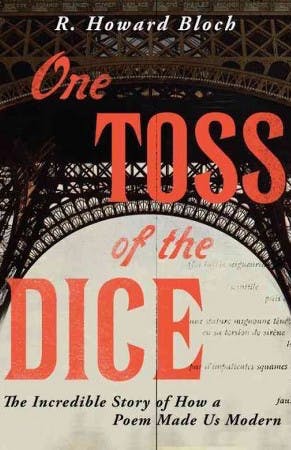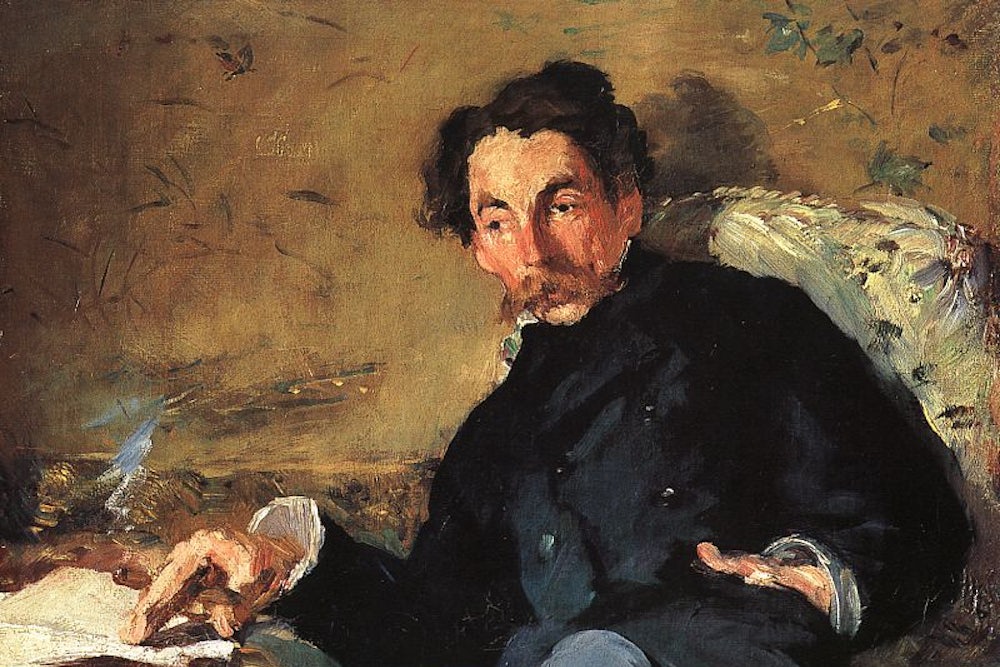A year before his death in 1898, French Symbolist poet Stéphane Mallarmé published his chef d’oeuvre, a 20-odd-page poem titled “Un Coup De Des Jamais N’abolira Le Hasard” (One Toss of the Dice Will Never Abolish Chance). No one agrees on how it should be read. It spreads out in all directions on the page, inverts normal French word order, eschews ordinary punctuation, and presents a variety of fonts, typefaces, and letter sizes. It surprises its reader with oddly placed italics and eccentric full-word capitalizations. It offers, in short, a cornucopia of visual oddities that seem arbitrary yet torment the reader because they suggest the possibility of meaning. It induces a thoroughgoing bewilderment that borders on mystification.

Attempts to elucidate Mallarmé’s poem have often served instead to create still more entrancing forms of mystification. In 1969, the Belgian Surrealist Marcel Broodthaers made a bold tribute to the work: René Magritte had given him a copy of the poem in 1945 in hopes that he would explain it; instead, Broodthaers replicates Mallarmé’s careful scattering of text on the page but replaces its words with black ink blocks. Absence morphs into presence as unmarked space advances and seeks to hold our attention, while the ebony words, which normally focus our minds when we read, sporadically recede. Blankness is broken only by the “plume solitaire éperdue” (“solitary wandering feather”) in tiny italics and then, just toward the center of the book’s spine, the lonely word “sauf” (“except”). What can we make of all this?
The latest scholar to argue for our renewed attention to this arcane work is R. Howard Bloch, in a new book called One Toss of the Dice: The Incredible Story of How a Poem Made Us Modern. His book follows the poem’s influence after Mallarmé’s untimely death and proposes that its publication marked the beginnings of twentieth-century Modernism. He argues that Mallarmé’s transcendence of conventional poetics, his spatio-temporal gyrations, his yearning efforts to collapse signifier and signified, his wish to erase all boundaries between word, idea, and object, as well as between art and life, paved the way for innovative Modernist thought and practice in literature, music, visual art, philosophy, modern physics, and even prefigured aspects of today’s digital era. It’s precisely the poem’s difficulty that makes its influence so enduring.
In explicating the formal eccentricities of Mallarmé’s work, however, Bloch forgoes the lenses of psychology. Yet, it is psychology that may help us to parse the emotional tone of the long, mysterious poem, and emotion is a crucial element that often goes missing in discussions of it. By psychology, I mean delicate, nuanced, non-reductive efforts to connect an artist’s life with his or her art; I mean the posing of questions as to how inner streams of feeling find external expression in objects of aesthetic value and originality. As Bloch himself perceptively writes: “For Stéphane Mallarmé, the first decade and a half of his life must have felt like a shipwreck during which he had been tossed overboard.”
Born in 1842, during the reign of “Citizen King” Louis Philippe, Mallarmé came from a bourgeois family with royalist sympathies, which negatively influenced their reputation so that, in contrast to many of his later artistic circle, the poet lived modestly throughout his life and survived by toiling for decades as an English teacher in two lycées. His performance in this role was so poor that, a school inspector noted, 14 of Mallarmé’s students, all pooling their knowledge, could not translate the sentence “Give me some bread and water.” Eventually, the brilliantly eccentric poet, dwelling in a Parisian walk-up on the rue de Rome, managed by dint of his sparse poetic output and other critical and cultural writings, to attract the city’s literati and its glittering artistic milieu; he established his famous “mardis,” his Tuesday night salons, where he held forth in a smoke-filled living room surrounded by many of the most interesting minds of France and England.
Baptized Étienne, Stéphane Mallarmé was his parents’ firstborn child, and, at five, after the birth of a sister, he lost his mother to fatal illness; then, almost immediately, his father, who vanished into the arms of a new young wife, and had three more children in rapid succession. Beyond bereavement and feelings of abandonment, chance also brought him exile, as the little boy was sent away to his grandparents’ home and subsequently to a hated boarding school. There, despite being supremely gifted, he proved too miserable to perform well academically, later failing his baccalaureate exam on the first try. When he was 15, death struck another blow, and he lost his treasured younger sister Marie, his one link to their mother and “the only person I adored,” as he wrote to his best friend.
A few years later, Mallarmé came upon a melancholy, slender blond German girl named Maria Gerhard, who was working locally as a governess. Re-naming her “Marie” after his sister, he fell in love and pursued her doggedly, married her, and never abandoned her, although her intellect and dour personality did not match his own. As he later said, “I read and write, she embroiders and knits.” Loathe to suffer deprivation once more, he may have felt her constant presence a comfort. Although, in time, he pursued an erotized liaison with Proust’s inspiration for Odette de Crécy, Méry Laurent, his role as a family man remained intact. “Hasard,” in daily life, was kept strenuously at bay, flowing fitfully and circuitously into his art.
Marie bore him a daughter they named Geneviève, and then a son upon whom he doted, Anatole. In Paris, their life played out, increasingly, against a backdrop of exotic characters familiar to today’s readers from both history and fiction. Robert de Montesquiou, for example, notorious as Proust’s inspiration for the dissolute Baron de Charlus, gently romped with little Anatole on his visits to the Mallarmés. Once again, death struck. The boy was eight. Crushed, the poet composed aborted lines of abject grief:
child sprung from
the two of us—showing
us our ideal… father
and mother who
sadly existing
survive him as the two extremes—
… —from whence his death—o-
blitrating this little child “self”
To read Mallarmé’s poetry against a backdrop of repeated unpreventable tragic human loss is to attune oneself to its elegiac aspects. Knowing this, we can better understand how, in “Un Coup de Dés,” the empty space never feels empty. The poem denies sequential time and refuses to observe the normative conventions of narrative and poetic art. In so doing, it symbolically refuses the ineluctable limits of human life.
Consider its title. Bloch points out that Jamais (Never) is out of sequence for an ordinary French sentence, where it would conventionally follow the verb. What then motivates this terrible “Never,” with its abnormal, jarring priority? What is this extreme of negativity that cannot be gainsaid? If the poem emerges, in part, from repetitions of grief, that “Never” may point toward death. Death came early and often to the poet and by chance. It is that with which he cannot be reconciled even when he evades sequential time in favor of a pretense—the creation of a virtual universe of simultaneity. But each human life, after all, starts and ends. No tricks of the intellect can disrupt that fated aspect of our being.
The poet’s privations, suffered in childhood and then later as the father of a child, suffuse “Un Coup de Dés” with much of its affective quality. Imagine a boy overcome, fatefully, by a succession of griefs that rained down upon him. He bears them in his heart until—in Mallarmé’s case—he can invent ever more subtle and nuanced means for representing them again and again in his poetry, this very form of expression itself being indebted also to chance—to his crucial meeting at age seven with the daughter of a friend of his stepmother. This lady, Fanny Dubois-Davesne, taught him how to rhyme, and it is she to whom he wrote his first poem, promising her to be wise (good) and to love her always, this from a child whose mother had been laid to rest barely two years before.
Throughout much of Mallarmé’s adult life, he yearned quixotically to create a magnum opus that could encompass the entire world and render it into words. He wanted to collapse the gap between representation and what is represented. Psychologically, this wish can be interpreted as an intellectual defense against the agony of mourning. Perhaps, as Bloch suggests, such a “harmony of words and things” recalls us to St. Augustine and the Holy Sacrament, where language and object merge and past becomes present. But from a psychological perspective, it is a move that constitutes a retreat from the embodied human condition.
“Un Coup de Dés” resembles not so much sacrament as a mental state in which time stands still and one looks in vain for what cannot be found in the form one seeks it. Is it in the stars, the constellations? The mists? The surging waters? Is it in unruly syllables that wander high and low on the page and defy meaning? Ever-present waves of hurt kept uneasily at bay drift by, and they occasionally bring shape and coherence, so that something integral, if vague and elusive, seems now to coalesce and now re-fragment. Despite the same four words appearing at its beginning and end, “Un Coup de Dés” feels incomplete. Readers turn away from it questing, like Bloch, in his fine new book.
“Un Coup de Dés” was published in a form that made Mallarmé unhappy. He died soon after, but one doubts the poem would have fared differently minus this final blow of chance. An overlooked gift of the poem may be its unwitting revelation that Modernism itself is haunted by loss, that is, by a rejection of traditional ways of containing emotion, however inadequate. Another may be that psychology, proffering lenses of value, deserves not to be, in literary discussions, forsworn.
